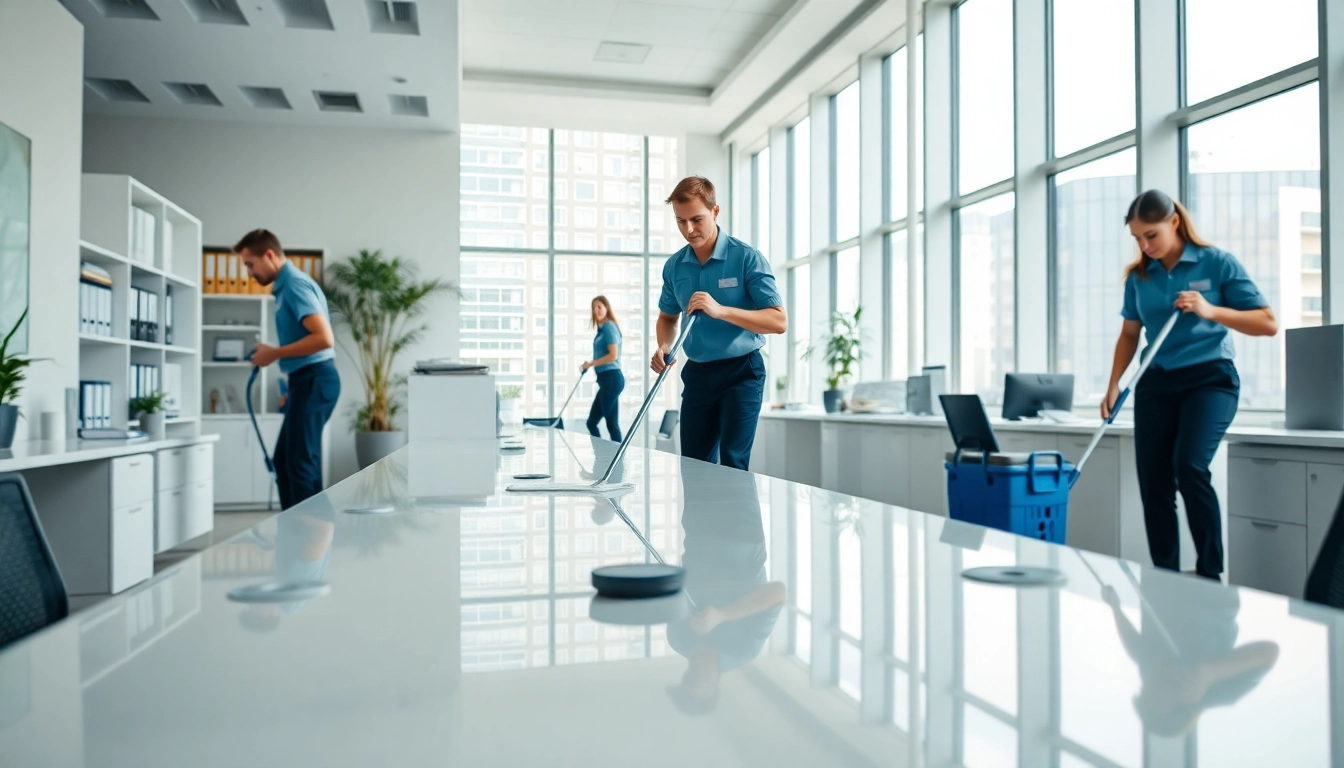
Understanding the Importance of Office Cleaning Melbourne
In the hustle and bustle of today’s corporate world, maintaining a clean and organized office space often takes a backseat. However, businesses in Melbourne are increasingly recognizing that a clean workplace not only enhances the aesthetic appeal but also contributes significantly to overall productivity and employee health. Engaging a reliable service for office cleaning Melbourne can transform the work environment into a more inviting and efficient space.
Health Benefits of a Clean Workspace
The health benefits of maintaining a tidy office cannot be understated. A clean workspace reduces the likelihood of illness caused by germs, allergens, and dust. Employees exposed to cleanliness are less likely to experience respiratory issues, allergies, and other illnesses that can detract from their productivity. Regular cleaning can help to:
- Reduce the presence of allergens such as dust mites and mold.
- Minimize the spread of germs and viruses that thrive in shared workplaces.
- Improve indoor air quality, leading to better overall employee health.
Furthermore, a tidy environment can significantly enhance mental well-being, allowing employees to focus better on their tasks. In contrast, cluttered and dirty workplaces can increase stress and hinder creativity.
Impact on Employee Productivity
A clean office plays a pivotal role in boosting employee productivity. Numerous studies have shown that a tidy environment allows for better concentration and efficiency. Employees can find necessary resources quickly, focus without distractions, and work in a pleasant atmosphere. When they are not worried about dirt or clutter, they can channel their energy into their responsibilities. Here’s how cleaning impacts productivity:
- Increased Focus: A well-organized workspace allows employees to concentrate better on their tasks without the distractions of clutter.
- Enhanced Morale: Clean and pleasant environments can uplift employee moods, leading to greater job satisfaction and teamwork.
- Lower Absenteeism: Healthier employees tend to take fewer sick days, reducing disruption and maintaining workflow.
First Impressions Matter: Client Perception
Client perception is crucial in the competitive business landscape of Melbourne. A clean office can convey professionalism and attention to detail. When clients walk into a welcoming space, their trust in the company increases. Factors influencing client perception include:
- First Impressions: A clean lobby and workspaces create a positive first impression, which is invaluable in making lasting partnerships.
- Brand Image: Regular office cleaning reinforces a professional image, showing clients that the company values its environment as much as it values its service.
- Trustbuilding: A well-maintained office fosters a sense of stability and reliability, further strengthening client relationships.
Key Services Offered in Office Cleaning Melbourne
Routine Office Cleaning Tasks
Routine cleaning services typically encompass daily or weekly tasks that keep the office looking its best. These services include:
- Dusting and Wiping: Regular dusting of surfaces such as desks, shelves, and electronics helps to maintain a clean and hygienic workspace.
- Vacuuming and Mopping: Floors should be vacuumed and mopped to prevent dirt accumulation and enhance appearance.
- Trash Removal: Regular disposal of waste prevents overflow and keeps areas clean and pleasant.
- Restroom Cleaning: Regular cleaning and sanitization of restrooms are vital for hygiene and employee comfort.
These tasks can be scheduled based on the needs of the business, and must be done efficiently to ensure minimal disruption to daily operations.
Deep Cleaning Services: What to Expect
Deep cleaning goes a step beyond routine tasks and is essential for maintaining a truly clean office space. These services typically include areas that are often neglected during regular cleaning routines:
- Carpet Cleaning: Professional carpet cleaning can remove deep-seated stains and allergens, significantly improving indoor air quality.
- Window Cleaning: Clean windows enhance natural light and can dramatically improve the office atmosphere.
- Upholstery Cleaning: Furniture can collect dust and allergens; therefore, deep-cleaning upholstery is important for hygiene.
- Kitchen and Break Room Cleaning: This includes thorough cleaning of all surfaces, appliances, and areas where food is consumed.
Deep cleaning services are often performed less frequently than routine tasks but are critical for maintaining the overall hygiene and appearance of the office.
Specialized Cleaning Solutions for Different Industries
Different industries have varying cleaning needs based on the nature of their work. Specialized cleaning services are tailored to meet these specific requirements:
- Healthcare Facilities: Strict hygiene standards demand specialized cleaning solutions to prevent healthcare-associated infections.
- Educational Institutions: Classes and common areas require consistent cleaning to create a safe learning environment.
- Industrial and Manufacturing Spaces: These spaces may require heavy-duty cleaning and maintenance protocols to manage debris and compliance with safety regulations.
Choosing a cleaning service that understands the specific needs of your industry ensures compliance with regulations and contributes to a cleaner, safer environment.
Choosing the Right Office Cleaning Melbourne Provider
Evaluating Experience and Expertise
When choosing an office cleaning provider, experience and expertise are paramount. An established service is likely to possess the necessary skills and knowledge to handle various cleaning challenges. Businesses should look for:
- Years of operation and range of services provided.
- Staff qualifications and training, including certifications in cleaning standards.
- Knowledge of the latest cleaning products and technologies that enhance service delivery.
Assessing Customer Reviews and Testimonials
Reviews and testimonials can provide valuable insights into the reliability and effectiveness of a cleaning service. Prospective clients should:
- Look for testimonials on the provider’s website and external platforms.
- Pay attention to feedback regarding punctuality, quality of service, and customer support.
- Request references from similar businesses to gauge satisfaction levels.
Positive reviews and case studies can indicate that a service provider delivers consistent results and values customer feedback.
Understanding Pricing Structures
When evaluating office cleaning services, understanding pricing structures is essential for making informed decisions. Factors to consider include:
- The frequency of cleaning required and the total area to be serviced.
- Pricing models, such as per-hour rates versus flat rates for specific services.
- Whether materials and equipment are included in the quoted price.
By acquiring multiple quotes and clarifying what is included, businesses can find a service that aligns with their budget while meeting their cleaning needs.
Best Practices for Maintaining a Clean Office
Daily Cleaning Checklist for Employees
Encouraging employees to participate in maintaining a clean office can be effective and engaging. An easy daily cleaning checklist may include:
- Clearing clutter from desks at the end of the day.
- Wiping down surfaces used throughout the day.
- Proper disposal of rubbish and recycling materials.
- Organizing shared spaces like break rooms and meeting areas.
This not only ensures a cleaner workspace but also fosters a sense of responsibility and pride among employees.
Encouraging a Clean Work Culture
A clean work culture must go beyond floors and desks; it should promote an environment where cleanliness is valued. Strategies to encourage this culture include:
- Setting a clean office policy that aligns with company goals.
- Providing employees with cleaning supplies for their desks and shared spaces.
- Recognizing and rewarding teams that exemplify excellent cleanliness habits.
By embedding cleanliness into the organizational ethos, companies can improve overall workplace health and employee satisfaction.
Seasonal Deep Cleaning Routines
Seasonal cleaning ensures that the office gets the attention it needs beyond routine maintenance. Designing a deep cleaning schedule can help in managing these activities proactively:
- Developing a quarterly or biannual deep cleaning plan that targets specific areas.
- Utilizing seasonal transitions as reminders to refresh spaces, including windows and carpets.
- Scheduling these deep cleans during times of lower activity to minimize disruption.
Seasonal cleaning contributes significantly to maintaining an attractive and healthy work environment.
Measuring the Effectiveness of Office Cleaning Melbourne
Key Performance Indicators for Cleaning Services
It’s important to evaluate the effectiveness of cleaning services through key performance indicators (KPIs). Common KPIs include:
- Quality audits of cleaning results.
- Employee and client satisfaction surveys.
- Frequency of complaints regarding cleanliness.
Monitoring these factors can help businesses ascertain whether their cleaning provider meets expectations.
Frequency of Service vs. Satisfaction Levels
Determining the frequency of cleaning services is critical to ensuring satisfaction levels remain high. Many companies benefit from:
- Adjusting frequencies based on employee feedback and observed cleanliness.
- Testing different service schedules to find the optimal cleaning frequency.
- Gathering data on how service frequency correlates with employee performance and satisfaction.
This helps in aligning service levels with the specific needs of the workspace.
Client Feedback: How to Implement Changes
Actively seeking and implementing client feedback is fundamental to improving cleaning services. Steps to effectively incorporate client feedback include:
- Conducting regular surveys to obtain insights on cleanliness expectations.
- Providing easy channels for clients to express concerns or suggestions.
- Reviewing feedback in regular meetings and making necessary adjustments to service delivery.
By valuing client input, businesses can foster stronger relationships while enhancing service quality.





